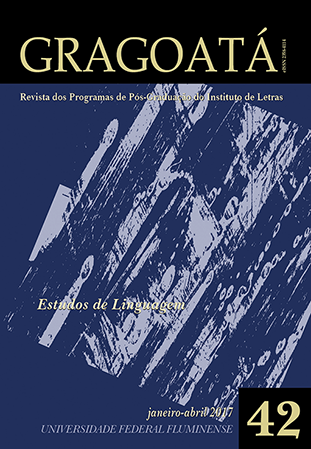Language policies in the city of Itaiópolis-SC: relations between language and identity
DOI:
https://doi.org/10.22409/gragoata.v22i42.33467Keywords:
Identity. Language policies. Polish language.Abstract
This article proposes a discussion on language policies related to the maintenance of the use of Polish immigration language in Itaiópolis - Santa Catarina, which had meant immigration of this ethnic group in order to discuss the relationship between language policies in vivo and in vitro (CALVET, 2007), and the relationship that can be established between language and identity. For this, views of community members, taken in this research as language policies agents, are presented. We emphasize that the majority of participants is linked to any project aimed at the maintenance of language and immigration culture, among which we highlight two projects, the first is a Catholic Church’s project that aims to offer Polish lessons for the community and the second is developed at a state school which aims to provide opportunities for students to get in touch with the language and Polish culture through contact with native speakers of Poland. As a result, we emphasize that it was revealed that the spheres of in vivo administration and in vitro relate quite markedly. In addition, in relation to the identity issue, we realize that this can be considered the main force behind these agents of language policies.
---
DOI: http://dx.doi.org/10.22409/gragoata.2017n42a864
Downloads
Downloads
Published
How to Cite
Issue
Section
License
Authors who publish in Gragoatá agree to the following terms:
The authors retain the rights and give the journal the right to the first publication, simultaneously subject to a Creative Commons license CC-BY-NC 4.0, which allows sharing by third parties with due mention to the author and the first publication by Gragoatá.
Authors may enter into additional and separate contractual arrangements for the non-exclusive distribution of the published version of the work (for example, posting it in an institutional repository or publishing it in a book), with recognition of its initial publication in Gragoatá.

Gragoatá is licensed under a Creative Commons - Attribution-NonCommercial 4.0 International.











